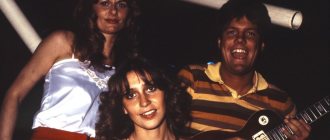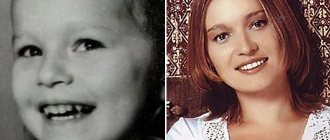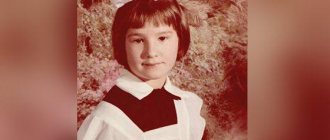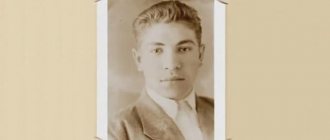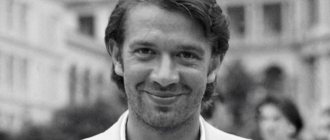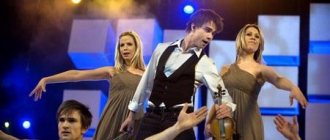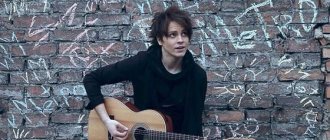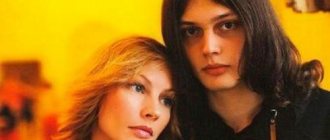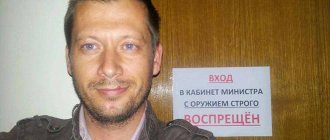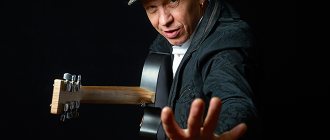Family and difficulties
From the biography of Alexander Nikolaevich Vertinsky, you can find out that the child was orphaned at the age of five. The death of parents became the reason for being raised by relatives. The boy had an older sister, Nadya, but other people took her in, so his closest relatives grew up separately. During this period, the boy did not show any zeal in his studies, and in the second grade he was completely expelled. This educational institution, which was unsuccessful for the child, was the Alexander Gymnasium. The adults who took the child into custody decided to transfer the boy to a place where it would be easier to study, but he was again expelled, and again for the same reasons - his academic performance was too low. The child himself at that time enjoyed only music, so his favorite places were city streets and the Vladimir Cathedral during the period of choral chants.
From the biography of Alexander Nikolaevich Vertinsky, you can find out that the boy was born in Kyiv, and it was here that he lived the first years of his life. In 1913, he managed to save up as much as a quarter of a hundred - considerable money at that time, and all of it was spent on a trip to Moscow. The child dreamed of becoming an actor - this was precisely the goal of his journey. In the capital, he ended up in Mamonovsky Lane, where he attracted the attention of the owner of the Miniature Theater. Maria offered the new guy a job, and so the debut took place. The name of the number has been preserved in history - “Tango”. During the performance, Vertinsky stood near the wings and sang a song filled with irony, making sharp comments about the dancing couple on stage. The act turned out to be incredibly successful, and the young artist received borscht with cutlets as payment.
The youth and beginning of the artistic path of Alexander Vertinsky
The notoriety of a hooligan and thief prevented him from becoming a member of the choir.
He decided to try himself in an amateur performance at the theater in Podol. However, the mini-debut ended in complete failure. For his addiction to the theater and stealing money, Alexander was kicked out of the house by his aunt. Spending the night in doorways and squares, the guy made money wherever he could. He was a loader, a salesman, an assistant accountant, and a proofreader in a printing house.
This continued until His Majesty chance gave Vertinsky a meeting with Sofia Nikolaevna Zelinskaya. As a girl, she was a friend of her mother, and now a teacher at a girls’ gymnasium. In her house, Alexander recognized Marc Chagall, Nikolai Berdyaev, Nathan Altman.
The journalistic pen and critical reviews brought in royalties. An 18-year-old boy bought a tailcoat, in the buttonhole of which a new fresh flower adorned every day, and set off to conquer Moscow. It was from there that the news came that sister Nadya was alive. The girl became an actress and served in the theater of miniatures of Maria Alexandrovna Artsybusheva.
Alexander Vertinsky. Song about Stalin Vertinsky's first theatrical "salary" was cutlets and borscht. Soon, in the newspaper “Russkoye Slovo”, a famous critic spoke flatteringly about the young artist in just a few words. And success began to literally pursue Alexander.
Without difficulties - nowhere
In the biography of Alexander Nikolayevich Vertinsky, they always tell for what purpose the young man broke away from the settled places of Kyiv and went to the capital - he had a dream to play in the production “At the Lower Depths” based on Gorky’s materials, and to play not just any role, but the Baron. Vertinsky tried to get into the Moscow Art Theater, but it ended in failure due to difficulties with pronunciation. The attempt was made in 1913. The young man was among the best selected, in the top five contenders, but at the last exam he came across Stanislavsky, who drew attention to the boy’s burr. That's where it all ended - the path to the Moscow Art Theater was closed.
It so happened that before the outbreak of the First World War, Alexander Nikolaevich Vertinsky was able to organize for himself all the possibilities of a bohemian life. It was then that he first encountered cocaine; The promising artist became addicted almost immediately. At that moment, the drug was considered perhaps the most powerful doping agent for creative people, and it could be purchased in a simple pharmacy without any restrictions on sale. The German product, in a sealed brown package containing one gram of powder, was available to anyone with enough money. True, as contemporaries noted, Vertinsky soon realized that addiction was ruining him, and decided to fight it with drastic measures: he went to fight as a volunteer.
Orderly and artist
It is known that Alexander Nikolaevich Vertinsky ended up at the front as a medical orderly. His place of service was the 68th train, organized by the cities of Russia that entered into cooperation. There was a book with the train in which it was necessary to enter each dressing procedure. Vertinsky dealt with difficult cases, and the easy ones were dealt with by the girls who served here. When the service ended, it was calculated from the book that Vertinsky had bandaged the wounded 35,000 times. He returned to peaceful lands in 1915 because he himself was wounded.
From the middle of this year until the end of 1917, as is known from any short biography of Alexander Nikolayevich Vertinsky, he had the opportunity to perform disguised as the sad Pierrot. As the artist noted, this was a spontaneously born image that reflected the period of his service - in those days, orderlies organized small performances for the wounded. Makeup was mandatory for them, as it helped them cope with self-doubt and the fear of speaking in front of a crowded audience. Thanks to the mask, the young artist quickly came to his senses. In 1917, he gained experience, toured most of Russian cities with performances and found the strength to give up makeup. From now on, he performs in a special tailcoat.
Life at home
At first, he felt happy and prepared for the performances with enthusiasm. The family was given a room at the Metropol Hotel, where they lived for three years until they got an apartment in Moscow. Censorship covered most of his songs. They clearly did not trust him, concerts were rare, there were no invitations to the radio, only a few of his records were published, critics were silent. The actor and singer was not recognized in the Soviet Union, but despite this, the creative biography of Alexander Nikolaevich Vertinsky was replenished with more than three thousand concerts. He toured the country several times and received enthusiastic applause from the public each time.
Home and its absence
In many photos of Alexander Nikolaevich Vertinsky you can see beautiful, but not at all Russian, landscapes behind him. This is due to the vicissitudes of his life - in 1917 it was decided to emigrate to Constantinople. The artist sailed from Russia on the same ship with Wrangel. In Turkey, they managed to purchase a Greek passport, and from that moment on the man identified himself as Alexander Vertidis. What’s curious is that he never ended up in Greece, but he visited a huge number of countries and places on our planet.
In total, as his creative and personal biography tells about his life, Alexander Vertinsky spent more than two decades in exile. His greatest fame came during the period of living outside his native country. For a two-year period he lived in Turkish cities, from where he moved to Romania. Vertinsky was in Bessarabia, lived in Polish and French cities, and settled for some time in the German capital. He lived in European powers until 1934, then moved to Shanghai for another nine years. In 1943, it was decided to return to their homeland. Vertinsky became a citizen of the world, and his difficult life was filled with adventures and travel. However, Kyiv remained his tender and beloved homeland, which he saw in his dreams, for the rest of his life - and Vertinsky himself spoke about this more than once.
Life awaiting return
There was a war on the territory of the Soviet Union. In 1942, 17-year-old Lydia Vladimirovna Tsirgvava, the daughter of a Soviet employee of the Chinese Railway, became the wife of the artist, who by that time was 51 years old. Vertinsky's work became completely different. As the years passed, the love songs took on a tone of despair. Thoughts about approaching old age and the inexorability of time shone through the lines of his last works. The Japanese occupation worsened the already difficult situation of the Vertinsky family. In 1943, a desperate Vertinsky wrote to Vyacheslav Molotov, begging him to allow his family to return, and promised to serve his Motherland until the end of his days. And finally the long-awaited resolution came. The biography of the wife of Alexander Nikolaevich Vertinsky is closely connected with his life. His family with little Marianna left China for Russia and began to live in Moscow. Alexander Nikolaevich's youngest daughter, Anastasia, was born in 1944.
China and Russia
Although disputes about the nationality of Alexander Nikolaevich Vertinsky sometimes arise to this day, officially he was Russian, a Soviet pop figure, actor and author, and in practice he was a citizen of the world, not limited by any borders of countries. In 1935, he decided to go to Chinese lands, where he settled down for no less than eight years. Here he first encountered financial problems, and his bohemian life came to an end. By the way, it was for this reason that the sudden approval of returning to his homeland made the artist extremely happy: by this time he was mired in debt and did not expect any help. Deciding to overcome financial difficulties, Vertinsky took a risk and invested in the Gardenia cabaret. However, within a month the establishment went bankrupt, and a possible early return home was postponed indefinitely: the composer and lyricist was awaiting the end of World War II, while at the same time gradually dealing with accumulated debts.
Being on the verge of despair, the artist sent a letter addressed to Molotov. The author of many famous songs, Alexander Nikolaevich Vertinsky, received permission to cross the border in 1943. In November of this year, the actor and his wife and little daughter (Marianna was 4 months old) settled in one of the Moscow neighborhoods.
Songs
Vertinsky’s performance of songs is impossible not to recognize, forget, or confuse with the performance of another artist. His mannerisms, cutesy pronunciation, drawling of words and original placement of accents always attracted attention and forced us to stop and listen.
The content of the lyrics often does not correspond well to the intonation chosen by Vertinsky for delivery from the stage. Putting on a Pierrot costume, covering his face with whitewash, drawing thin lips and broken eyebrows, he acts as a mime, playing the role of a deeply unhappy, lonely person.
It is impossible to forget the songs he sang to “Junkers”, “About Us and About the Motherland”, “Magnolia”, “Yellow Angel”, “Little Creole”, “I Laugh at Myself Today”, “The Purple Negro”, “The Lord’s Ball”, “Yours” fingers smell like incense” or “I’m a little ballerina.” Nowadays, Alexander Domogarov, Tatyana Kabanova, Boris Grebenshchikov, Alexander F. Sklyar and some other artists perform his songs with great taste and delicacy, trying to preserve the magic created around them by a wonderful master.
Alone and not alone
Today, many people love the creation “Yellow Angel” by Alexander Vertinsky, and connoisseurs would give a lot to hear it performed by the author. It so happened that even the artist’s contemporaries did not have too many opportunities to appreciate his talent. After returning from a long stay in exile, the talented man occasionally gave performances in the capital’s institutions, sometimes in Leningrad. He was not invited to speak on the radio, the publication of records was prevented, and newspapers did not publish reviews of his work.
It is known that about a hundred songs were written in total. Alexander Vertinsky was able to publish only about three dozen of them - all the rest were banned. Each of the artist’s concerts took place under the supervision of a censor who controlled compliance with the framework established by the state.
Not only political, but also personal experiences complicated the life of a famous person. As is known from the biography of Alexander Nikolaevich Vertinsky, he had two wives. The first was called Rachel, the second was Lydia. Lida was 34 years younger than her husband. She is known for her acting career, has played in several popular films and published the book “The Blue Bird of Love”. It was from this woman that Vertinsky had two daughters: Marianna, Anastasia. Both of them followed in the footsteps of their parents and became famous actresses.
Personal life
Alexander Vertinsky's first marriage, unfortunately, lasted only seven years. The singer’s chosen one was the Jewish beauty Rachel (Raisa) Pototskaya, who after her marriage changed her name and became Irena Vertidis. Vertinsky met the girl in Poland.
Alexander Vertinsky and his wife Lydia
Vertinsky’s personal life developed more successfully only 19 years later. While in Shanghai, Alexander Nikolaevich met the charming Lydia Tsirgvava. The girl was 34 years younger than Vertinsky, but this fact did not stop the lovers. In 1942, Vertinsky married Lydia.
Alexander Vertinsky with his daughters
Soon his wife gave Vertinsky a daughter, Marianna, and then, a year later, a second daughter, who was named Anastasia. Both girls inherited their father's talent and artistry, later becoming famous actresses. And even Marianna’s daughter, Daria Vertinskaya (Khmelnitskaya), successfully began her acting career, which, unfortunately, she abandoned after some time.
Dates, numbers and titles
It is known that Alexander Vertinsky’s father was a private attorney. His name was Nikolai Petrovich. He was born into the family of a railway worker, was engaged in the legal profession, at the same time was a journalist and published his feuilletons in the Kievsky Slovo. The pseudonym Count Niveo was chosen for them.
Vertinsky's mother was noblewoman Evgenia Skolatskaya. At one time, Nikolai could not take her as his wife, because his first wife refused to get a divorce, and after some time he had to adopt his own children - Nadya and Sasha. Vertinsky recalled that his parents were incredibly deeply in love with each other, and conventions meant nothing to them. When the boy was three years old, his mother died, and two years later consumption caused the death of his father. The children were taken by their mother's sisters. The aunts prevented the brother and sister from maintaining contact, and for a long time Sasha was sure that his older sister had died. They met only a few years later and immediately became close to each other.
Childhood and adolescence of Alexander Vertinsky
Alexander Vertinsky's childhood passed without parental love.
The stigma of being an illegitimate child left its mark on his later life and career. At that time, such a phenomenon was considered unacceptable. Moreover, the boy was born from his father’s extramarital affair with young Zhenechka Skalatskaya. Evgenia was the daughter of the manager of the city noble assembly. And Vertinsky was already married.
Vertinsky as Pierrot
Both the misalliance itself and the birth of Nadya, Sasha’s older sister, infuriated all of pious Kyiv. Nikolai Petrovich Vertinsky was ready to marry Zhenechka, but his wife did not agree to a divorce. For Evgenia and little Nadya, a house was rented in the center of Kyiv on Vladimirskaya Street, where Sasha Vertinsky soon loudly announced the birth.
Alexander barely remembered his parents. The mother died when the baby was only 3 years old. He was raised by his mother’s elder sister, who hated her father and called him nothing more than “scoundrel,” believing that he was guilty of corrupting her sister.
Alexander's father, Nikolai Petrovich Vertinsky, was known throughout Kyiv. The famous lawyer was distinguished by his flexible and kind character. Sasha's sister Nadya stayed to live with her father. Evgenia’s death undermined Nikolai Petrovich’s health. He abandoned his affairs and sat for hours at her grave. In 1894, the disease claimed the life of Vertinsky Sr.
Alexander Vertinsky in his youth
By the will of fate, the orphans ended up in different cities. Sasha was informed that his sister had died (it was a lie) and now he was as lonely as a finger in the whole wide world.
Maria Stepanovna had a bad character and beat her nephew for the slightest disobedience. Alexander at that time studied at the aristocratic gymnasium No. 1 together with Konstantin Paustovsky and Mikhail Bulgakov.
The aunt's constant complaints led to the guy abandoning his studies and starting to steal money that pilgrims placed on the holy relics of the Kiev Pechersk Lavra. One day Sasha was caught red-handed. The scandal broke out throughout Kyiv. He was kicked out of the gymnasium, and his aunt severely beat him with a whip.
The punishment did not calm the guy down; he continued to steal. However, an undying spark burned in the young man’s interest in music and the art of theater. He loved to listen to the singing of the choir in the gymnasium church, and then he himself began to sing along.
The beginning of theatrical hobbies
It so happened that the nine-year-old boy passed the entrance exams for high school with excellent marks, although studying was not his favorite thing, which soon ended in exclusion. Subsequently studying at the Fourth Kyiv Gymnasium, he discovered theater for the first time and tried to take part in a performance. The future author of numerous songs, Alexander Vertinsky initially had an extremely unpleasant theatrical experience. He was hired as an extra at Solovtsov’s establishment. In the future, Vertinsky will meet many stars whose practice began with opera or operetta, but this world-famous author has made his way through literary opportunities. He himself admitted that he could not consider himself an artist, but he belonged to the bohemians in the field of literature. His work is more like the work of a poet, but not an artist, and what is important is not so much the performance as a comprehensive assessment of the work, the choice of suitable words that would form an original motive.
In many ways, what the poems of Alexander Nikolaevich Vertinsky became in the future was determined by Zelinskaya’s literary collection. The young author was surrounded by her and it was here that his unique style began to take shape, and with it his worldview. In Sophia's house one could often see Kuzmin, Elsner, Osmerkin and Malevich. Chagall and Altman were regulars. The ideas of beauty and the philosophy of this community greatly influenced Vertinsky; he gained considerable spiritual experience in the field of adolescence. He had the opportunity to review Chaliapin's performances, Vavich, Ruffo and Anselmi. In the future, the great poet, young Vertinsky published his own short stories in local publications. Gradually the name became more and more famous among local intellectuals. To make a living for himself, in those days Alexander worked as a loader and proofreader, a seller of postcards, often played roles in plays and even managed to work as an accountant in a hotel, from where, however, he was soon fired.
Alexander Vertinsky - military orderly (Part 1)
To the 100th anniversary of the start of the First World War 03/19/2014
The great Russian singer Alexander Vertinsky in 1914, as part of a train subordinate, as they would now say, to the public organization “Union of Russian Cities,” went to the front line as an orderly. Until 1916, when he was sent to the rear due to injury, the future internationally recognized chansonnier made more than 35 thousand dressings.
Alexander Nikolaevich Vertinsky was born in 1889 in Kyiv. He was illegitimate; his father, a lawyer, had another wife who would not grant a divorce. When the child was 3 years old, his mother, Evgenia Stepanovna Skolatskaya, died suddenly. The father later adopted his own child, but died himself two years later.
And little Sasha was raised by his mother’s sister. He brilliantly passed the exams for the best gymnasium in Kyiv - the Imperial 1st Alexander School, where such people as Mikhail Bulgakov, Konstantin Paustovsky, Anatoly Lunacharsky, Evgeny Tarle, Timofeev-Resovsky studied over the years.
However, soon, little Vertinsky’s interest in studying faded away. Due to poor academic performance, he was transferred to another gymnasium, a simpler one. And then they were expelled from that one too. At the same time, the young man read a lot and was seriously interested in theater and literature. Through his aunt, he ended up in the house of Sofia Nikolaevna Zalinskaya, a teacher at a girls’ gymnasium, who was married to Nikolai Vasilyevich Lunacharsky, the brother of Alexander Vasilyevich Lunacharsky, the future People’s Commissar of Education under Soviet power.
Frequent guests at Zalinskaya's literary salon were very famous people of that time - philosopher Nikolai Berdyaev, poet Mikhail Kuzmin, artist Marc Chagall.
They pushed the young high school student to engage in creativity. He begins to compose poems and stories. Some are even published in newspapers. He gradually joins the bohemian life. Having saved 25 rubles, a high school dropout goes to try his luck in Moscow. Having accidentally met the owner of a Moscow theater, Maria Aleksandrovna Artsybusheva, he told her about himself. He later wrote in his memoirs:
“She casually remarked:
“Why are you hanging around idle, young man?” You'd better become an actor!
- But I can’t do anything!
- If you don’t know how, then learn! - she said.
- But how much will I get for this? - I asked busily. She burst out laughing:
-Receive? What are you doing? In your right mind?.. There can be no talk of any salary. But at three o'clock we sit down to dinner, there is always borscht and cutlets. You can dine with us."
Thus began the theatrical career of Alexander Vertinsky. His first role was as a super-erotic dancer of the then fashionable tango. He danced, humming a song. The young actor was noticed. The first mention of the artist appeared in the newspapers: “Witty and cutesy Alexander Vertinsky.”
Vertinsky auditions for the Moscow Art Theater, the most desirable theater for all actors. Having passed all the rounds and entered the final five candidates, he was stopped on the threshold of his dream by Stanislavsky himself because of his burr. Which he would later turn to his advantage, making it his trademark.
Vertinsky is not discouraged. It is becoming more and more popular. He performs a lot. In the pre-war years, he chose the image of Pierrot for his performances. It must be said that at the beginning of the twentieth century, the image of the Italian comedy of masks was very popular in Russia. These images fit well into the aesthetics of symbolism, which then reigned in culture, in the aesthetics of modernity. Blok, Andrei Bely, Bryusov - everyone wrote about Harlequin, Columbine and others. So the image of Pierrot, a lovelorn, unhappy clown, was to some extent normal and common for that time. This image added amazing charm to Vertinsky’s eccentric nature.
Vertinsky then acted a lot, of course, not in leading roles, but this gave him a social circle, an invitation to bohemia, to the “Silver Age,” as this time would be called a little later. According to rumors, it was Vertinsky who brought the future silent screen star Vera Kholodnaya to the cinema. He dedicated several wonderful songs to her. “Little Creole”, “Your fingers smell like incense...”.
Your fingers smell like incense And sadness sleeps in your eyelashes. We no longer need anything, we don’t feel sorry for anyone now.
And when, as a spring messenger, you go to a distant land, God Himself will lead you along the white stairs to a bright paradise.
The gray-haired deacon whispers quietly, after the bow he bows. And with his sparse beard he sweeps away the age-old dust from the icons.
Your fingers smell like incense And sadness sleeps in your eyelashes. We no longer need anything, we don’t feel sorry for anyone now.
A world war has begun. This is how his daughter, actress Anastasia Vertinskaya, recalls those days from the words of Alexander Nikolaevich himself:
“All schools, private houses where there were large halls, institutes, gymnasiums, empty shops have been converted into hospitals. They are not only government-owned. Rich, patriotic people used their money to open hospitals for the wounded. The father saw a crowd of people near the mansion of the merchant daughter Maria Morozova on Arbat. It was the wounded who were brought from the station. They were carried out of the carriages on stretchers, and doctors were already working in the house. He came up and began to help. The doctor took a closer look at the tall boy and called him into the dressing room to unwind the dirty bandages and wash the wounds. - Why me? - Vertinsky will ask later. And he will hear: “I liked your hands.” Thin, long, artistic fingers. Sensitive. They won't hurt you."
Maria Savvishna Morozova, the daughter of the famous millionaire and philanthropist Savva Morozov, organized a sanitary train with her own money. Count Nikita Tolstoy was appointed its head. The train was subordinate to the “Union of Cities”. This public organization, which arose in the first days of the war, united patriotic rich people. True, later it turned into a hotbed of corruption and theft of public funds, but at first all its participants burned with a sincere patriotic impulse.
The train was painted gray camouflage, assigned the number 68, filled with medical equipment and sent to the front line. Newly-minted orderly Alexander Vertinsky also went to the front with them. The sanitary service on this train was equivalent to that of a soldier.
The actor, chansonnier, and poet went to bandage the wounded and clean the wounds of dried blood and pus. Remembering, Vertinsky writes that he registered on the train under the name “Brother Pierrot.” Forgive the great actor for his little weakness. The front-line hospital is a serious organization and no one there allowed such pranks. So Vertinsky served the Motherland under his real name and surname.
Vladimir Kazakov.
(End to follow)
Moscow times
The poems of Alexander Vertinsky were not yet valued too highly, and he decided to look for new opportunities in the capital region. Vertinsky moved to Moscow with his older sister, who by this time had already begun her career as an actress. They chose the Bakhrushin house in Kozitsky Lane as their habitat, began their performances in playwrights' communities, and began to look for ways to enter the literary community. Alexander got the opportunity to direct Blok’s production of “The Showcase” - in those days, Blok’s creations were extremely popular among young people. In many ways, Vertinsky’s own worldview and style were formed under the influence of Blok, whom he spoke of as the element that shapes the human world. He noted that all representatives of the bohemian world were harsh, hid something, criticized someone, were ambitious and filled with unrealizable desires. Over this pettiness of life blew the poetic wind of Blok’s poetry, free and intoxicating, infecting the hearts of young people with dreams of a Beautiful Lady. It is worth noting that Vertinsky himself did not try to imitate his idol, but was only impressed by his images and lived by the principles that he himself considered close to Blok.
With the participation of Alexander Vertinsky, the film was first released in 1912. His debut role can be seen in Ilya Tolstoy’s film “How do people live?” The actor played an Angel falling from the sky. As he grew older, Vertinsky played many more roles, mainly in films by Khanzhonkov’s studio, mostly minor ones. One of them will be based on a poem by the poet himself - “The Lord's Ball.” The film set allowed Vertinsky to make many new acquaintances, which played a mutually beneficial role. For example, it is known that Vera Kholodnaya became so popular precisely because of Alexander, who recognized in a modest woman a demonic beauty who would conquer the hearts of many people in the future. By the way, he was her secret admirer, and among the works of Alexander Vertinsky, the best, in the opinion of many, poem was dedicated specifically to Vera - “Your fingers smell like incense.”
Recognition of the talent of Alexander Vertinsky, filmography
In 1912 he made his film debut.
The role of an angel in the film by Ilya Tolstoy, who made the film based on his father’s story, became a passport to Moscow bohemia. Back then, many actors dabbled in cocaine. This fate did not spare Alexander and his sister. In 1914, Nadezhda poisoned herself with drugs and died. Vertinsky, in order to escape drug captivity, volunteered for the front.
Alexander was accepted as an orderly on the 68th train, which ran from 1914 to 1916 between Moscow and the front line. He observed the operations of the famous Moscow surgeon Kholin and brilliantly mastered the dressing technique. His dressings were legendary. At the end of his service in 1916, the orderly had 35,000 dressing changes on his record.
Alexander Vertinsky. Sailors Vertinsky returned to the Artsibasheva Theater of Miniatures, where his original number “Songs of Pierrot” was staged. The war years left their mark on his creativity, his songs told people the truth, made them believe and dream.
The singer gave concerts in front of soldiers of the Volunteer Army, and then with a new passport and under a new name he went to Europe. Austria, Germany, France and Belgium, Poland and Romania admired Vertinsky both in chic restaurants and in modest chantans and cabarets.
Vertinsky lived for a long time in America, where his concerts were a great success. To reach broader horizons, it was necessary to study English. But the singer believed that only in Russian could he express everything that his songs convey.
For a long time, Alexander Nikolaevich lived in China. He performed a lot in Shanghai and was a crowd favorite. In 1936, the Soviet government began negotiations on the return of Vertinsky to his homeland. He had to wait seven long years for a positive verdict, while the writer Kuprin returned after 2 years.
New trends
1913 was marked by the acquaintance of the now famous author of the poem “Madam, the leaves are already falling,” Alexander Vertinsky and Mayakovsky. The poet was close to the futurists, although their philosophy caused him some rejection. Vertinsky more than once spoke about another contemporary - a northerner, whose poems he recognized as talented, sincere, real, while at the same time believing that the author lacked taste, sensuality and an understanding of the limits of reason. Vertinsky admired Mayakovsky, but for him the other futurists were shocking bourgeois pretending to be geniuses. The First World War was approaching, and Vertinsky, who decided to escape cocaine in this way, went to the front. After returning from the battlefield, he learned that it was the drug that caused the death of his sister - she died from an overdose.
Leningrad: last concert
Alexander Vertinsky. Photo: mgarsky-monastery.org
The Vertinskys settled in Moscow. The artist traveled a lot around the country on tour - he performed in mines, factories, and hospitals. In 1957, his last concert took place at the Savina Stage Veterans House in Leningrad. After the performance, Alexander Vertinsky became ill and died a few hours later.
Cities in the life of Alexander Vertinsky
Author: Elena Antonova
Life: personal aspects
Once in Sopot, the famous poet, who by this time was already living in exile, met his first wife. Alexander Vertinsky was attracted to the intelligent, charming Jewish girl Rachel. Little information about her has survived to this day. It is known that in 1924 they got married, while the poet remained inclined to mystify all the events of his life. In the new passport, the lady was recorded with a new name - Irena Vertidis. But in life, as you know, the artist called her Rali.
Alexander Vertinsky did not live long with his wife - the relationship did not work out. In total, they were together for eight years, sometimes scattering, sometimes reuniting. Her husband was characterized by constant loves, insignificant, petty, but for Rachel they were beyond what she could tolerate, and this personality trait of her chosen one remained the main problem. Vertinsky, it is worth noting, dedicated a song to his wife - this happened in 1930, and called the work “Song about my wife.”
Development of a relationship
After suffering for several years, the couple decided to divorce, and on May 26, 1942, the poet entered into a new marriage - with young Lydia, the daughter of a CER employee. The girl was 19 at that time, and the artist was 34 years older than her. It is known that Lydia Vertinskaya and Alexander Vertinsky loved each other, nevertheless, the lady’s fate was full of hardships. The poet spoke over and over again about his ardent feelings for the chosen one of his heart, he wrote songs for her. They met when Lida was only 17, and even then her parents were opposed to such a relationship - the age difference seemed too significant. Even then, the mother warned her daughter that nothing good would come of it, and she predicted that she would soon end up a widow. The girl followed her heart, and subsequently Lydia will say more than once that there is nothing stronger than love in this world.
The correspondence of Alexander and Lydia Vertinsky has survived to this day. The artist wrote surprisingly touching letters to his wife and said many times that only her letters could calm him down, that only she loved and adored her. More than once he argued that he would not be worth living if Lydia did not exist.
Biography of Alexander Vertinsky's wife
Lida was born in Harbin (China), into a Georgian family. Her grandfather was a former officer, was engaged in beekeeping and had a substantial farm. Lida's father, Tsirgvava Vladimir Konstantinovich, served on the Chinese Eastern Railway. Lida's mother, Lidia Pavlovna Tsirgvava, née Fomina, was an exemplary housewife. When the girl was 10 years old, her father passed away. In Shanghai, Lydia met Alexander Vertinsky, who at that time was already fifty. In 1942 they got married.
Alexander Nikolaevich and Lydia Vladimirovna Vertinsky
And in 1943 Alexander and Lida went to their homeland. The Vertinskys lived in the Metropol Hotel, where they were placed, for three years, and then moved to the apartment provided to them. Lydia drew beautifully, and in 1955 she received a diploma as an artist, graduating from the Institute. Surikov. After that, she began working at a printing plant and participated in art exhibitions. The biography of the famous artist’s wife was closely connected with art.
The Vertinsky family - Alexander Nikolaevich, Lidia Vladimirovna and daughter Marianna
Lydia Vertinskaya did not plan a career as a film actress, but a chance meeting with film director Alexander Ptushko determined her creative biography. When filming of the fairy tale film “Sadko” (1952) began, she was offered the main role. She brilliantly coped with the main role in the film “The Kingdom of Crooked Mirrors” (1963) and in “Kievlyanka” (1958), where Lydia Vertinskaya played Frau Martha. After this there were two more films: “The New Adventures of Puss in Boots” (1957) and “Don Quixote” (1957).
Lydia Vertinskaya in the film "Sadko"
Lydia Vertinskaya in the film "Don Quixote"
In their marriage, the Vertinskys had two daughters - Marianna and Anastasia Vertinsky, who became Honored and People's Artists of the RSFSR. And at 34, Lidia Vladimirovna was left without a husband. The main meaning of her personal life has always been family. She earned money by selling her paintings. Lydia Vertinskaya has three grandchildren and five great-grandchildren, who loved and idolized her very much. She lived for 90 years, long outliving her only and always beloved husband, Alexander Vertinsky.
Alexander Vertinsky with his daughters: Marianna and Anastasia
Daughter of Alexander Vertinsky - Anastasia Vertinskaya in the film "Amphibian Man"
The eldest daughter of Alexander Vertinsky is Marianna Vertinskaya, 2018.
Family and Children
In 1943, the poet's eldest daughter Marianna was born. The name was chosen by his mother under the influence of the film about Robin Hood, where that was the name of his beloved. In order to provide for himself, his wife and child, Vertinsky gave concerts twice a day, however, the period of the Japanese invasion significantly undermined the family’s material well-being. Lydia will later recall that during the occupation there was no access to imported products, emigrants did not receive medicine, simple aspirin became incredibly valuable, and Alexander pawned a concert coat to provide for his family. Before the performance, he bought it back, and after, he handed it back again.
The second half of the 1930s was marked by numerous attempts to return to their homeland, and in 1937 an invitation followed, but it could only be accepted after the debts were paid. In order to demonstrate loyalty to the domestic authorities, at that time Vertinsky began publishing in Novaya Zhizn, a local publication with a pro-Soviet attitude. But then World War II broke out, and the documents were never completed. When Molotov allowed Vertinsky to return home, he immediately began active work: in those days he gave several concerts every day.
Vertinsky abandoned all women for Lila
“The Lord God sent her to me,” said Alexander Vertinsky about his wife Lydia. They met in Shanghai. After the concert, a beautiful girl approached the singer backstage. She herself recalled this meeting:
“His strange, speaking-singing voice pierced my soul with sweet pain... It was as if they were driving a gramophone needle not across a disk, but through my heart.”
He was 52 and she was 18.
When Vertinsky had children, a family, a wife, a house, he wrote: “The worst thing - women - left my life.” Meaning, of course, other women.
Wedding in Shanghai
In a conversation with Lidiya Vladimirovna, I ask a question:
— And you weren’t scared by such an age difference?
“This difference horrified my mother.
...Lydia was of Georgian origin. Her grandfather and grandmother settled in China, remaining Russian subjects. My grandfather, a former officer, maintained a large farm and raised bees. My father served on the board of the Chinese Eastern Railway and was considered a Soviet employee. He died suddenly in Harbin when Lydia was ten years old.
The mother was categorically against her daughter’s marriage to a famous chansonnier. But Lida insisted on her own.
In 1942 they got married. A year later, their first daughter, Marianna, was born.
— I read that in Shanghai you lived quite poorly. It was difficult to even buy a stroller for a child...
- They gave it to us. To support his family, Alexander Nikolaevich took two jobs. I sang in one place until one in the morning, then until the morning - somewhere on the very edge of Shanghai.
— Did Vertinsky tell you about his marriage to a woman named Irene?
— He called her Irina Vladimirovna. Her name is actually Rachel. They separated in Shanghai. When we met, they were already living separately.
— Is it true that Alexander Nikolaevich called you Lilya?
- Liloy. When we met, he asked: “What is your name?” I said: “Lidya, but everyone calls Lidya.” And the Georgians called her Lila. Alexander Nikolaevich liked it: “Then you, too, call me Sandro.” I was embarrassed, of course, to call him Sandro. Alexander Nikolaevich...
No capital was brought from emigration
— There is a photograph in the editorial office. You and Vertinsky are very close. You are wearing a wonderful dress with a deep neckline and three rows of pearls.
- Well, these are not natural pearls. And Vertinsky had a white tuxedo made of “sharkskin” material - translated as “shark skin”. Very pleasant to the touch, thick silk... By the way, where did you get this photo?
— At the Metropol Hotel.
- Very interesting! We returned home from China in 1943. Vertinsky was well received then. At Metropol they gave me a room with a bay window. We lived in the hotel for three years. And then we got a spacious apartment, in which I still live.
- But you acquired a dacha much later...
— Two years before my husband’s death, in 1955. Alexander Nikolaevich got it into his head that if he bought a dacha, he would provide for us and could die in peace. And having bought a dacha, I dreamed of having a cow.
- A cow?
- He was a little naive. Sometimes there are men like this. With great talents and naive. In Ukraine he had landowner aunts. He remembered how they made sausages and salted lard. And I wanted to send an old man and an old woman from Ukraine to take care of the house. The dacha cost us a lot. And Vertinsky went to Siberia, Sakhalin, Kamchatka to earn money. In winter, for three months. This is such torture! The husband did not complain about his health. But these tours took their toll.
— The storyteller Ptushko invited the Phoenix bird to play you in the film “Sadko”...
“At first they wanted to paint my face with gold paint. I studied art history and remembered the incident in Florence. There, at the holiday, the boy was covered with gold paint. He died by nightfall. I said: “Just do some makeup for me.” They put a crown and pendants on me. A red ruby was glued to his forehead. Since I was not an actress, another woman voiced me in the film. I needed a low voice: “Sleep, sleep…” But I always had a clear voice.
— Have you acted in films yet?
— In “The Adventure of Puss in Boots”, “The Kingdom of Crooked Mirrors”, “Don Quixote”. And after the death of Alexander Nikolaevich - in “Kievlyanka”. Actually, I graduated from the Surikov Institute and worked at a graphics plant for many years.
— Thanks to Ptushko, your 15-year-old Anastasia got into Scarlet Sails. But I dreamed of being a ballerina.
“She was small, thin, with long legs. Mashenka was stronger. And this one is all so airy. She didn't walk, she flew. Alexander Nikolaevich took her to a ballet school. But something didn't fit. Much later, my husband attended Ulanova’s performance. To express his delight, he came backstage. And I saw that the ballerina was trembling all over and sweat was streaming from her face. Then he wrote to me: it’s good that Nastenka was not accepted into the ballet. It's such hard work!
— Your incredibly beautiful daughter Anastasia, married to Nikita Mikhalkov, gave birth to a beautiful son, Stepan.
“Nastya and Nikita were so young at that time. They studied together at drama school. And in order to register, they ran away from the lecture. Then... they broke up, but their relationship remained good. And our Stepan already has three children.
- Anastasia Alexandrovna surrounded by so many grandchildren?!
“She just adores them.” Spends so much time with them. The youngest grandson turned one year old on March 21. Stepan's first girl. After that there was a long break. Then a boy appeared. And four years later Kolenka was born. It was on Alexander Nikolaevich’s birthday. In general, everything is in dates. It’s as if everything is written in heaven. Marianna was born on St. Vladimir's Day, and Nastenka was born on St. Nicholas the Pleasant's Day. On big holidays.
Family beauty secret
— Tell me, please, how do you, the Vertinskys, manage to preserve your beauty?
“I’ll say one thing: you shouldn’t give in to base feelings.” Anger or jealousy. My girls are very religious, I am also a believer. Anastasia observes all fasts strictly. During them, he eats only what grows from the ground. Before my anniversary, I asked her what to cook. She refused fish. I asked that the potato salad not be topped with mayonnaise. Fasting is very good for the body, it rejuvenates.
— How is the eldest daughter Marianna doing now?
— She works at the Vakhtangov Theater. Once Ruben Simonov put her to play the role of Turandot in line with Borisova. Her eldest daughter Alexandra, like me, graduated from the Surikov Institute. And she trained for two years in Paris at the Academy of Fine Arts.
Actually, you know, Alexander Nikolaevich really didn’t want his daughters to be actresses.
— Returning to Russia, you lived in a hotel for three years. And Vertinsky also died in the hotel...
- In the Leningrad Astoria. Alexander Nikolaevich was on tour. He felt bad and asked for validol. While they were looking for a cure, he died. It was instant death.
PS Lidiya Vladimirovna recently completed a book about her husband Alexander Vertinsky, daughters, and grandchildren. It is being prepared for publication by the publishing houses “Zebra” and “EXMO”.
Life goes on
In the second half of the last month of 1944, Vertinsky’s second daughter was born. Her mother chose the name Anastasia for her. She said that this choice was made under the impression of Vertinsky’s story about a child’s love for a girl, Nastya. Soon after the birth of his second child, one of the most famous works of Alexander Nikolaevich Vertinsky, “Daughters,” was written. This song spread throughout the Union and brought it incredible success.
The war period was remembered by the Vertinsky family for numerous tours in the front-line zone. The artist performed songs of his own authorship and performed works of other Soviet writers. Many were surprised by the presence of tragic notes in the love lyrics of Vertinsky, whose personal life, it would seem, turned out just fine. Subsequently, the daughter will remember that at that time her father said that he had nothing but a name known to the whole world. He had to give concerts about 24 times a month, but this gave him the opportunity to send fruit home.
In just 14 years of work, he performed more than 2,000 times. Concerts were organized in special halls, orphanages, hospitals and factories. He visited the capital region singing extremely rarely, and the press perceived him somewhat hostilely, although calmly, given the popular fame and love of the common people for the singer. Meanwhile, the war came to an end and at the state level a struggle unfolded against lyrical sentiments in songs - supposedly they interfered with the building of socialism. Vertinsky was not directly named, but it was obvious to everyone that they were talking primarily about him. The few records that were still available were confiscated and destroyed, and not a word was written about the concerts anywhere. The singer, beloved by the people, seemed to not exist at all.
Return of Vertinsky to Russia
At home, Alexander Nikolaevich sang more than 2000 concerts.
The people loved him and received him warmly and cordially. However, there was no official, state recognition of his art. Stalin liked his songs, liked his poems, for which he personally thanked Vertinsky. But the press kept silent about the artist, as if he did not exist in the country. Alexander Nikolaevich did not need fame, he had it. But he wanted to be recognized in his beloved homeland.
Alexander Vertinsky is buried at the Novodevichy cemetery in Moscow
Career doesn't stop
After 1945, Vertinsky continued his career as an actor. His unusual appearance and outstanding manners were actively exploited by directors, which is especially clearly seen in the film “Anna on the Neck.” Having played in “Conspiracy of the Doomed,” Vertinsky received the only award in his life from the state - the Stalin Prize.
The last years of Vertinsky's life were marked by a spiritual crisis. In 1956, he wrote to the woman he loved that he had no friends, that everyone had only their own selfish interest, and no one cared about the fate of those around them.
Endless tours, the need to endure beggarly lamentation, rejection from the authorities - all this caused a sharp deterioration in his health. Vertinsky joked bitterly that in the future he would have to write a book, “The Path to a Heart Attack.” He considered his tours to be exiles and wrote letters from there to his beloved wife, telling him what unbearable conditions he had to live in. Nevertheless, Vertinsky did not give up, trying to earn money to ensure the future of his daughters. He admitted that living in the country was catastrophically difficult, and called his concerts self-immolation. Many times he drew parallels between the stage and the scaffold.
Theater and cinema
The first fees instilled in the young man confidence in his own abilities and awakened the desire to become famous. At the same time, Alexander learns that sister Nadezhda is alive and working in the Moscow theater. In 1913, Vertinsky, in search of a better life and glory, went to Moscow.
Actor Alexander Vertinsky
Alexander Vertinsky's theatrical career began with small studios and amateur theaters. At that time, it was fashionable among young people to stage their own plays. Soon Vertinsky was invited to the Theater of Miniatures on Tverskaya Street. The team was led by Artsibusheva Maria Alexandrovna. Vertinsky's first performance caused a flurry of delight from the audience. After this, Alexander continued to go on stage, as well as write topical skits and parodies.
Alexander Vertinsky in the film “Anna on the Neck”
In the same 1913, Vertinsky tried to enter the Moscow Stanislavsky Art Theater, but the great master did not accept Alexander because of his diction: Vertinsky did not pronounce the letter “r” clearly. Vertinsky also tried his hand at cinema. The first film with the participation of Alexander Nikolaevich is “Cliff”. Vertinsky got a small role, but it was an invaluable experience.
Alexander Vertinsky in the First World War
Alexander Vertinsky's film career was interrupted by the war. At the end of 1914, Alexander Nikolaevich signed up as a volunteer orderly at the front, where he spent about a year. In January 1915, the singer and actor was wounded and was forced to return to Moscow. There Vertinsky was already waiting for the news about the death of his sister, whom Alexander considered the closest person. There is information that the girl died due to a drug overdose.
Love and life
The most valuable, the most important in Vertinsky’s life were his two girls, daughters, about whom he never ceased to care and worry. Particularly significant for him was his own plot of land - a small dacha where it was decided to raise and raise children. The Vertinskys looked for a plot suitable for a dacha for a very long time, and one day Fradkin’s wife told them about the small station “Otdykh”, where there was a dacha for sale. They looked at it in 1955 and found that the house was in disgusting condition, but the place around seemed wonderful to the artist. He decided to purchase the plot for an amount that was several times more than the real price. Vertinsky in those days worked at three rates, for each of which he received 270 rubles a month. Nevertheless, he did not regret investing his work, money, practically his life in this dacha. Its renovation and improvement was a slow, gradual process. A significant role was played by the actor’s impracticality, his inability and even naivety in everyday life. Fortunately, Lydia turned out to be a more down-to-earth person, ready to offer better ways out of the situation; moreover, she had enough willpower to out-argue her stubborn husband.
In May 1957, Vertinsky gave a concert for the last time. He and his wife had dinner at the WTO and danced to orchestral music, and the next day the artist left for Leningrad - his wife never saw him alive again. The famous creative figure died on May 21. The cause was heart failure. He died in the Leningrad Astoria Hotel, having arrived in this city to give a concert. The Moscow Novodevichye cemetery was chosen as the burial place.
For many of our contemporaries, Vertinsky is a legend and reality rolled into one: charming, mysterious, incredible. His work was bright and touching, and for Russian culture Vertinsky is a significant page demonstrating that beauty is always higher and stronger than any politics. His talent has been preserved in the people's memory for centuries, and the name of this author, poet, artist, and most talented person has been imprinted for the future. In 2011, a documentary film dedicated to his fate was released.
